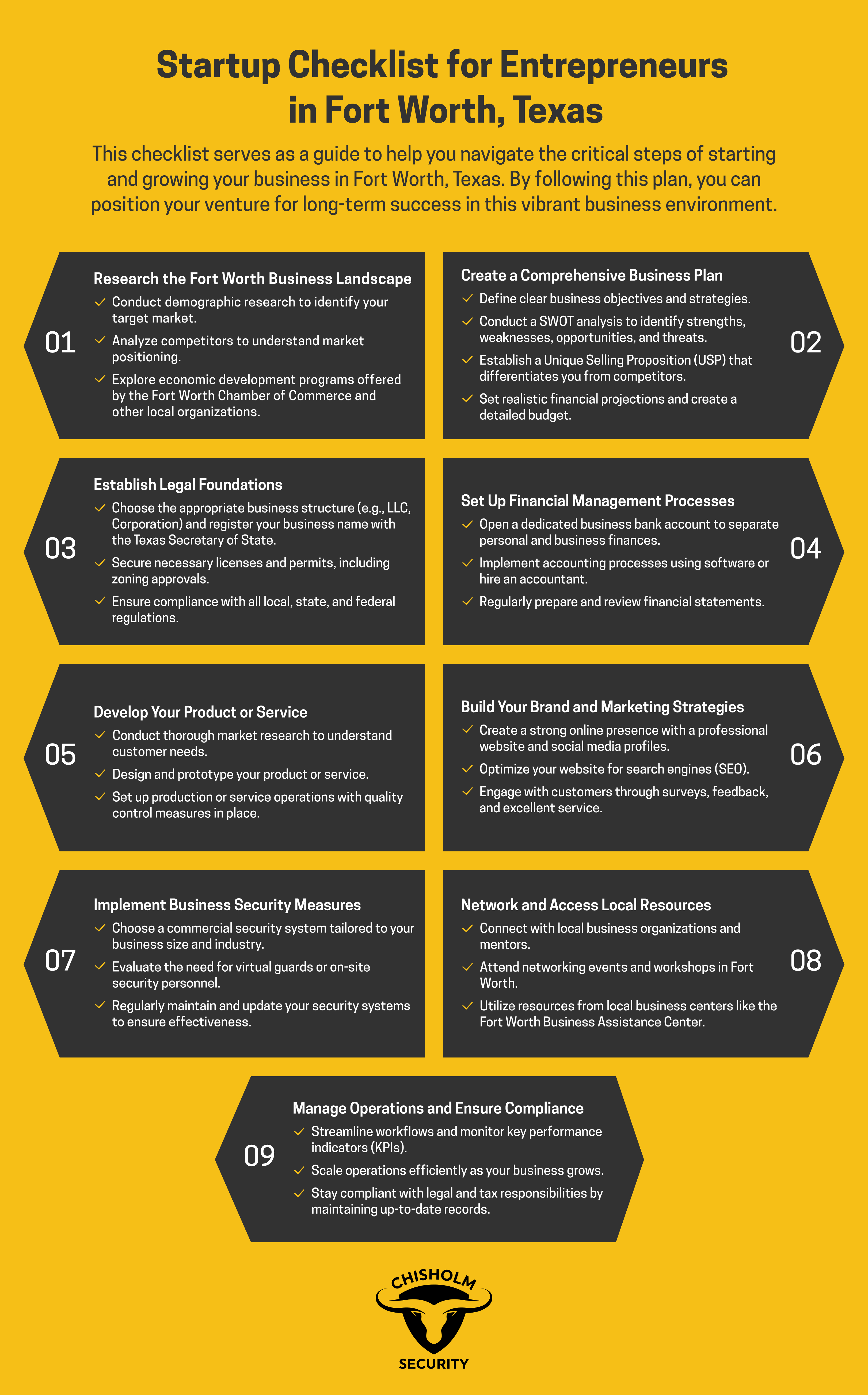New Business Checklist Template for Entrepreneurs in Fort Worth, Texas
Starting a new business is an exciting yet challenging journey, especially for entrepreneurs in Fort Worth, Texas. Navigating the bustling business landscape of Fort Worth requires a well-thought-out strategy and a comprehensive checklist to ensure every important aspect, including security, is covered. Our New Business Checklist Template for Entrepreneurs in Fort Worth, Texas, simplifies this process, offering clear and actionable steps to launch your venture successfully.
Fort Worth offers a unique environment for entrepreneurs, with diverse opportunities for growth. Understanding this landscape is crucial for tailoring your business plan to local market conditions, legal requirements, and security needs. In a city where commercial success is partly tied to the ability to protect assets and personnel, establishing a reliable video security system from the outset is key.
Whether it’s financial management, marketing strategies, or security infrastructure, every aspect of your business must be meticulously planned to thrive in this vibrant Texas city. By following our checklist template, you can confidently navigate these initial stages, ensuring that your business is not only compliant and efficient but also secure.
Key Takeaways
- Fort Worth offers a unique business environment with diverse opportunities.
- Our checklist covers essential steps from legal compliance to security and financial setup.
- Utilizing local resources can enhance your startup’s potential.

1. Creating Your Business Plan
When creating a business plan, entrepreneurs need to strategize carefully and focus on accurate financial projections and budgeting to ensure long-term success in Fort Worth, Texas.
Strategizing for Success
Effective strategizing is important. We must begin by clearly defining our business objectives and target market. Analyzing market data and competition aids in forming a strong value proposition. Utilizing tools such as SWOT analysis helps us identify strengths, weaknesses, opportunities, and threats.
We should also establish our unique selling proposition (USP) to differentiate ourselves. This involves outlining our product or service’s advantages and how it fulfills customer needs better than competitors. Setting realistic milestones and outlining actionable steps is essential. Frequent evaluation and adaptation of our strategy keep us aligned with our goals.
Financial Projections and Budgeting
Accurate financial projections and budgeting form the backbone of any robust business plan. We need to prepare detailed revenue forecasts, taking into account market trends and customer demand. Identifying fixed and variable costs helps in understanding the total budget required.
Creating a comprehensive budget includes estimating costs for marketing, operations, staffing, security, and other expenses. We should also plan for contingencies to accommodate unexpected expenditures. Regularly monitoring cash flow statements and profit-and-loss projections keeps our finances on track. By maintaining financial discipline, we can ensure that our business remains solvent and well-positioned for growth.
2. Establishing Legal Foundations
When starting a new business, it’s crucial to establish robust legal foundations to ensure compliance and protect the company’s interests from the outset. Key considerations include choosing an appropriate business structure and securing necessary licenses and permits.
Choosing a Business Structure
Selecting the right business structure is essential as it affects your legal liability, taxation, and operational complexity. Common structures include sole proprietorship, partnership, limited liability company (LLC), and corporation.
A sole proprietorship offers simplicity and direct control but comes with unlimited personal liability for business debts. A partnership entails shared management responsibilities and profits but also shared liabilities.
For those seeking to limit personal liability, forming an LLC is a common choice. It combines the liability protections of a corporation with the tax efficiencies and operational flexibility of a partnership. Alternatively, a corporation provides the strongest protection against personal liability, but with more regulatory requirements and tax obligations.
We must also register our business name with the Texas Secretary of State and acquire an Employer Identification Number (EIN) from the IRS for tax purposes.
Securing Licenses and Permits
To operate legally, various licenses and permits might be needed, depending on the type and location of the business. In Fort Worth, local zoning requirements are crucial to ensure our business activities comply with city regulations.
We need to check if special permits are required, especially if we are dealing with food services, health, or professional services. The Texas Department of Licensing and Regulation provides specific guidelines and requirements.
Additionally, we should verify state-specific business licenses applicable in Texas. For instance, service-based businesses often need professional licenses, while retail establishments require sales tax permits.
When installing a commercial security system for your new business, make sure you comply with both state and local laws and regulations. This applies to both alarm systems and video surveillance regulations.
Ensuring that all necessary licenses and permits are secured helps avoid potential legal issues and fines, setting a strong foundation for future growth and compliance.
3. Financial Management Essentials
Managing finances effectively is crucial for the sustainability of any new business. Ensuring proper accounting processes and securing adequate funding are key to maintaining a healthy financial state.
Setting up Accounting Processes
Establishing robust accounting processes is fundamental. Start by opening a dedicated business bank account to separate personal and business finances. This helps in accurately tracking income and expenses.
Regularly preparing financial statements such as the profit and loss statement and the balance sheet is essential. These documents offer insight into our financial health and guide decision-making. Utilizing accounting software or hiring an experienced accountant can simplify this process and ensure compliance with tax regulations.
Forecasting and creating a budget helps us manage cash flow and prepares us for unforeseen expenses. Keeping meticulous records of all transactions and receipts aids in this effort, providing clear visibility into our financial performance.
Acquiring Funding and Managing Capital
Securing adequate funding is vital for business growth. Explore various funding options including personal savings, loans, and investments from investors. Each option has its pros and cons, requiring careful consideration of interest rates, repayment terms, and equity stakes.
Once capital is acquired, managing it effectively ensures the longevity of our business. Setting aside a portion of our capital for emergencies and operational expenses can prevent cash flow issues. Additionally, maintaining detailed records of all expenditures and systematically reviewing financial statements can help in making informed decisions.
Regular financial assessments and adjustments based on our financial state keep us agile and prepared to pivot when necessary. Clear communication with our financial advisors and investors also ensures transparency and trust.
4. Developing Your Product or Service
Creating a successful product or service requires strategic planning and careful execution. Focus on market research, design, and production/service operations to ensure the new business in Fort Worth thrives.
Market Research and Design
Market research is the foundation for any new product or service. We begin by identifying our target audience. Understanding their needs, preferences, and pain points is important. Use tools such as surveys, focus groups, and market analysis reports to gather relevant data.
Competitor analysis is another critical component. Identifying key competitors and understanding their strengths and weaknesses can help us position our products or services more effectively. Fort Worth’s business landscape is competitive yet collaborative, offering ample opportunities for partnerships and strategic alliances.
Next is the design phase. In this stage, transform the research findings into actionable design concepts. Here, creating prototypes helps us visualize and test our ideas. Feedback from potential customers during this phase is invaluable. It allows us to refine our product or service before full-scale production.
Production and Service Operations
Once the design is finalized, our focus shifts to production and service operations. For products, this involves selecting reliable suppliers and setting up an efficient manufacturing process. Quality control is essential to ensure the final product meets our standards.
For services, we outline the procedures and protocols necessary to deliver consistent and high-quality experiences to our customers. This includes training our team and setting up the infrastructure needed to support our service operations.
We also consider scalability. As our business grows, our operations need to be flexible enough to handle increased demand without compromising quality. By focusing on these key areas, we position our new venture for sustained success.
5. Marketing and Growth Strategies
To successfully launch and grow a business in Fort Worth, Texas, it is essential to use effective marketing and growth strategies. This section covers important aspects such as building a strong brand and engaging with customers to expand reach.
Building Your Brand and Online Presence
Creating a compelling brand is fundamental to attracting and retaining customers. One of the first steps is selecting a relevant and memorable domain name that reflects our business identity. Additionally, professional website design is crucial for making a good first impression.
Utilizing social media platforms such as Facebook, Instagram, and LinkedIn can significantly enhance our online presence. Engaging content and regular updates can help maintain visibility.
Search engine optimization (SEO) is another critical factor. By including relevant keywords and optimizing our website, we improve our chances of appearing higher in search engine results. E-mail marketing campaigns and blogging can also drive traffic and build customer loyalty.
Engaging with Customers and Expanding Reach
Customer engagement is at the heart of growing a business. Engaging with customers through direct interactions, surveys, and feedback forms helps us understand their needs and preferences. Providing exceptional customer service is essential to retaining customers and generating positive word-of-mouth.
Collaborating with local influencers and participating in community events can significantly expand our reach. These activities not only attract new customers but also reinforce our brand presence. Additionally, leveraging paid advertising options on social media and search engines can target specific demographics, enhancing marketing efficiency.
We should also consider partnering with complementary businesses to offer bundled services or cross-promotions. This can introduce our business to a broader audience and create a network of mutual support among local businesses.
6. Accessing Support and Resources
In Fort Worth, Texas, entrepreneurs can tap into a variety of resources and support networks to bolster their business ventures. From networking and mentorship to leveraging local business centers and events, the city offers numerous opportunities to help new businesses thrive.
Networking and Mentorship Opportunities
Building a strong network is crucial for any entrepreneur. In Fort Worth, organizations like the Devoyd Jennings Business Assistance Center provide opportunities for entrepreneurs to connect with experienced business leaders and mentors.
Mentorship programs can offer guidance and support, often making a significant impact on a new business’s growth. Accelerate Fort Worth and TechFW are also valuable for entrepreneurs seeking advice and insights from seasoned professionals.
Networking events hosted by local organizations offer a platform for entrepreneurs to share knowledge and establish partnerships. Engaging in these events not only broadens our network but also provides us with fresh perspectives and potential collaboration opportunities.
Leveraging Local Business Centers and Events
Fort Worth is home to several business centers that are designed to support entrepreneurs. The Devoyd Jennings Business Assistance Center offers resources such as business planning assistance, market research support, and access to funding opportunities.
Business centers like this are invaluable for new entrepreneurs who require practical tools and guidance. The Small Business Resource Portal provides a comprehensive directory of local support services, making it easier to find the necessary assistance.
Local events are another key resource. From workshops to seminars, these events often feature industry experts who can provide us with new insights and strategies for business development. Participating in these events helps keep us informed about the latest trends and best practices in our industry.
7. Navigating Post-Launch Activities
After launching a new business in Fort Worth, Texas, it’s crucial to focus on operational management and ensuring compliance with legal and tax responsibilities. Effective handling of these aspects can lead to sustainable growth and success.
Operational Management and Scaling
Once your business is up and running, managing day-to-day operations becomes paramount. We must ensure that workflows are streamlined and efficient. Regularly review operational processes to identify areas for improvement. Implementing a robust inventory management system can prevent out-of-stock and overstock situations, enhancing customer satisfaction.
Growth is another vital area to consider. We should focus on scaling operations smoothly by planning resource allocation effectively. This includes hiring the right talent and using automated tools to handle increased workloads. Monitoring key performance indicators (KPIs) allows us to measure success and adjust our strategies accordingly.
Challenges such as supply chain disruptions can be mitigated by establishing relationships with multiple suppliers. This ensures that our business remains resilient in the face of unforeseen events. Building a loyal customer base through excellent service and quality products should always be a priority.
Compliance with Ongoing Legal and Tax Responsibilities
Maintaining compliance with legal and tax responsibilities is vital for long-term success. We must stay current with Texas business tax requirements. Ensure that business tax returns are filed accurately and on time. Setting up an accounting system or working with a capable accountant can simplify this process.
Employer requirements are another key area. We must adhere to labor laws, including worker safety regulations and wage standards. Proper documentation for employees, such as I-9 and W-2 forms, is essential. This ensures we’re meeting state and federal guidelines.
It’s also important to protect our intellectual property, including trademarks. Properly registering trademarks can prevent legal issues down the road. Regular audits can help us stay compliant with all regulatory changes, keeping legal challenges at bay.
Starting a New Business in Fort Worth, Texas?
This comprehensive checklist ensures that all key aspects, from the business plan, legal compliance, and financial management to marketing and growth are thoroughly covered. By laying the groundwork and planning properly, we set ourselves up for long-term success.
As you prepare to launch, don’t overlook the importance of securing your business. A good security system is not just a protective measure; it’s a vital investment in the future of your company. At Chisholm Security, we offer customizable video security solutions to small and medium businesses in Fort Worth. Reach out to see how we can help you protect your new business.

